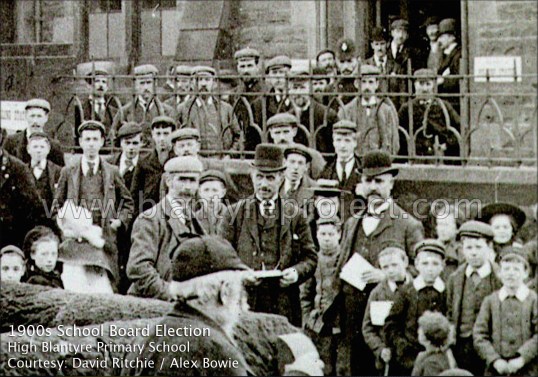 During a particularly sunny Saturday afternoon in mid March 1900, the triennial (once every 3 years) election of the Blantyre School Board took place. There were a number of old candidates looking for their old positions to be renewed and an equal number of new candidates canvassing for some fresh input into the board.
During a particularly sunny Saturday afternoon in mid March 1900, the triennial (once every 3 years) election of the Blantyre School Board took place. There were a number of old candidates looking for their old positions to be renewed and an equal number of new candidates canvassing for some fresh input into the board.
This incredible photo from 1906 or so shows a subsequent School Board Election. Pictured are the candidates outside High Blantyre Primary School on Hunthill Road, undertaking some last minute canvassing.
There was tremendous rivalry in the 1900 election. A subject spreading around Blantyre at the time was that the former School Board had wasted money by proposing Auchinraith Primary School, considered to be lavish and expensive, when a perfectly lesser building at a much reduced cost could have sufficed. Sentiment in Blantyre on this subject ran high, with some ratepayers believing their money had been wasted. The school was being built at the time but wouldn’t open until August later that year.
Very little posters and flyers were resorted too, the candidates preferring a direct approach to talk to people, relying heavily on their supportive committee men, well dressed to go out and canvas for them.
The poll opened at 10am on High Blantyre Polling Station located in the School on Hunthill Road and at the second station at Stonefield Parish School on Glasgow Road (Ness’s). These polling venue arrangements had been used previously in 1897. Throughout the afternoon voting steadily got brisker and more so as the end hour at 5pm approached.
At Low Blantyre’s polling station, Mr. A Maxwell presided (himself to later become a Councillor). Mr Robson and Mr. Ness assisted. At High Blantyre Mr. Brown was presiding officer assisted by Mr. Sillar and Mr. J. Brown.
The total number of eligible voters was low at only 2,500. Whilst Blantyre’s population was greatly more than that number, foreign nationals, women and of course children had no right to vote. As such, there was a distinct lack of any women near the venues. From the 2,500 people permitted to vote, 1,613 turned out, being 220 people more than the previous 1897 election. There were no tendered votes, all being cast in person. Mr. Brown, the returning officer declared the results after 10 o’clock once the votes were counted. There were 38 spoiled papers.
Each candidate was scored, the final results:
Successful
James Kelly * spirit merchant with 1596, Neil Douglas * cashier 1547, Thomas Devenney Spirit merchant 1417, John Menzies * colliery manager 1330, Dr Grant * 1236, Alexander Davidson * miner 1094, Rev C.S Turnbull minister of Established Church 1042, Rev James Campbell * Free Church 903, Angus McQuarrie of Ulva House 837
Unsuccessful
Dr J.C Wilson 833, William Small * secretary 677, Alexander Louden flesher 669, John Gray miner 407 and Hugh Lapraik colliery surface superintendent 332 (* denotes old members)
The result was a decided win for the old Board and completely vindicated them in any further allegation of overspending on the new school at Auchinraith. Mr Devanney took the place of Rev. Dr Hackett who had retired, whilst seats formerly occupied by Mr Walker and Mr Small were filled by Rev Turnbull and Mr. McQuarrie. The board scheduled to meet the following Tuesday where it was to be decided who would become Chairman.
At the passing of the Education Act in 1872, the Rev Stewart Wright was elected chairperson of the first Board in 1873 and was re-appointed in 1876. At the third election in 1879, when Mr. Wright was not returned, Dr. Grant who had been a member of the previous Board was appointed chairman, a position which he generously gave up after the succeeding election in 1882 in favour of Mr Wright, who again returned to the Board. It was however, during the life of that Board, that Dr Grant withdrew, his place being taken by Mr. Laing.
From “Blantyre Explained” by Paul Veverka (c) 2016
